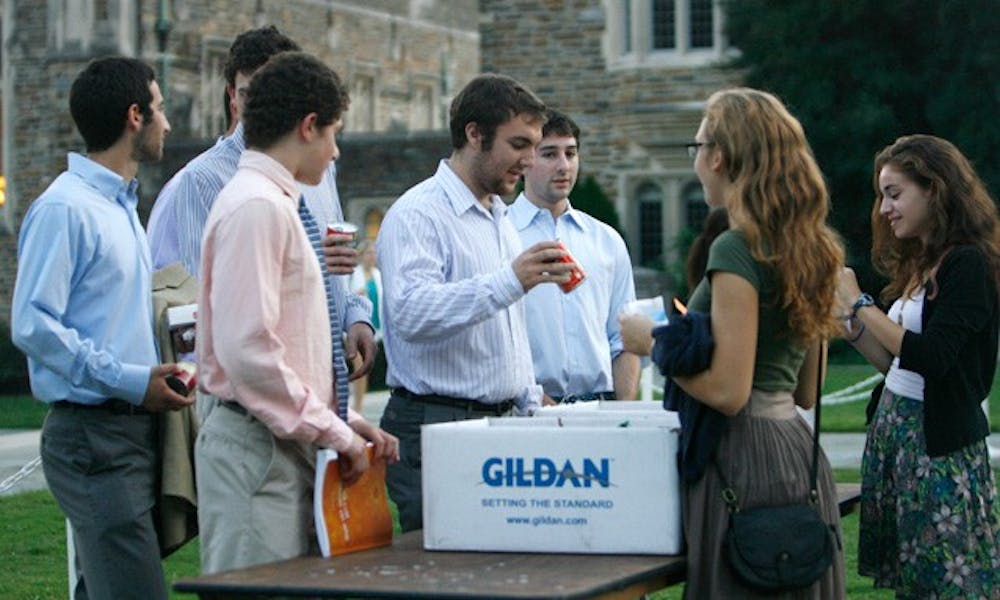The greek community was called to reconsider the values motivating its engagement in community service Tuesday night.
Members of the greek community gathered in the Duke Chapel Tuesday to commemorate the beginning of the academic year. Following a performance by the Pitchforks and presentations by greek leaders, Executive Director of DukeEngage Eric Mlyn addressed the audience about the relationship between greek life and philanthropy at Duke. Mlyn said he was impressed with greek charity events, but noted that this relationship is not always positive.
“The greek community is disproportionately responsible for some of the most negative aspects of the culture here at Duke,” Mlyn said. “Abuse of alcohol, inappropriate social relations—of an attitude that shows too much concern with the self and not enough concern with the other.”
Research has shown that the rise of social media has dulled students to personal connections and a desire to engage with communities in need, Mlyn said.
“The ease of having friends online might make people more likely to just tune out when they don’t feel like responding to others’ problems—a behavior that could carry over offline.”
Mlyn said he was unsatisfied with the greek community’s participation in DukeEngage thus far, but added that this group, which he called tremendously diverse and very talented, would be a positive asset to the program.
Some students have chosen not to participate in DukeEngage because they believe it will not necessarily help them in their future professional lives, Mlyn said. Community service, he said, will be a valuable experience though regardless of students’ motivation and life goals.
“[You] will not only help those communities but... develop the empathy, skills and sensibilities that will well prepare you for whatever you want to do with the next precious years of your lives,” he said. “[The mission of DukeEngage] is let a thousand flowers bloom and allow our students to pursue their passions wherever these passions take them.”
Mlyn noted that greek males are underrepresented in DukeEngage. Demographic research about students who apply and participate in the program shows that 18 percent of all female students at Duke are in sororities and 24 percent of greek women participate in DukeEngage. But 14 percent of male students at Duke are in fraternities, and only 8 percent of greek men do DukeEngage.
Evidence suggests that women are more empathetic than their male counterparts, making women more internally motivated to do service, Mlyn added.
Sophomore Mike Jin, a member of Delta Kappa Epsilon fraternity who participated in DukeEngage in China this summer, said in an interview that his DukeEngage experience was much more fulfilling than the community service he did for his fraternity.
“The greek community doesn’t take philanthropy seriously,” Jin said.
He added that DukeEngage helped him establish professional connections that could be beneficial in the future.
“I got to meet the top-notch executives, [though] it did not change my [plan of] going to medical school,” Jin said.
Before Mlyn’s presentation, senior Erica Nagi, president of Alpha Delta Pi sorority said philanthropic activities connect Duke to the outside community, citing her sorority’s work with the Ronald McDonald House.
“Our world inside the Duke bubble is different from outside of Duke,” Nagi said.
Seniors Joslyn Dunn, president of the National Panhellenic Council; Jenny Ngo, president of the Panhellenic Association; Zach Prager, president of the Interfraternity Council; and Xiao Zhu, president of the Inter-Greek Council, each expressed their pride in the philanthropic activities their communities had done at local, national and international levels.
“Our women pride themselves on [their] effort and its contributions not only to Duke and Durham but also the communities that we might not be able to reach physically,” Ngo said.
The leaders listed the many charitable activities conducted by each chapter in the past year, including working with children, serving the elderly and the homeless, raising awareness about gender violence and fundraising for natural disaster relief.
“The greek organization is not jut a social organization, ” Prager said. “I joined this fraternity in order to be part of something that is bigger than myself.”
Zoila Airall, assistant vice president for student affairs, encouraged the greek community to define their relationships with each other and the rest of the world through citizenship, community and character. Airall added that the list of achievements was astounding and representative of the greek community’s generosity.
Senior Alex Irwin, member of Sigma Pi fraternity, said the accomplishments of his peers inspire him.
“Hearing all the achievements of the brothers who were sitting next to me challenges me to do more,” Irwin said.
Sophomore Sam Marks, also a member of Sigma Pi, said that the convocation made him realize that greek philanthropy is effective.
“I feel we actually do things that make a difference,” Marks said.
Correction: Erica Nagi is the president of Alpha Delta Pi sorority, not Lauren Pfeiffer, as a previous version of this article stated. The Chronicle regrets the error.
Get The Chronicle straight to your inbox
Signup for our weekly newsletter. Cancel at any time.

